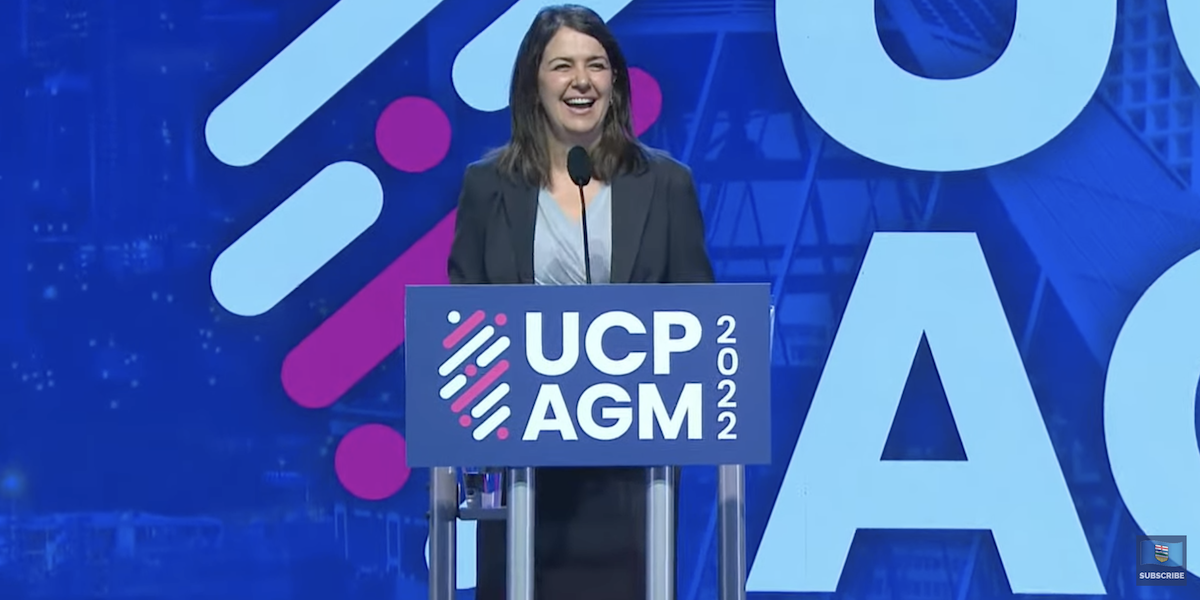So what happens now that half the 18 elected members of the United Conservative Party (UCP) board are vaccine-skeptical allies of Premier Danielle Smith?
While media was concentrating on the speeches and calls for unity at the UCP annual general meeting in Edmonton Saturday, members of the so-called Take Back Alberta group captured all nine contested positions on the party board.
These are people who not so long ago former premier Jason Kenney dismissed as lunatics.
“I assume that the other 9 are largely Kenney loyalists,” Mount Royal University political science professor Duane Bratt said in a tweet yesterday.
This is all very well while everyone in the UCP is doing their best to make a show of unity, but things could get interesting quite quickly if Smith and the party continue to slip in the polls.
One recent survey of voter intentions showed the NDP leading among committed voters with 53-per-cent compared to 38 per cent for the UCP. The same poll showed very low approval rates for Premier Smith compared to those of NDP Leader and former premier Rachel Notley.
A continued slide for the UCP seems quite possible with Smith determined to focus on her vendetta against Alberta Health Services for the public health measures it implemented during the pandemic.
After all, recent polling shows concern about the health care system is on the front burner for a majority of voters, but that doesn’t mean they share Smith’s obsessive fury at past vaccine mandates or even want to think very much about COVID any more.
While Smith might encounter opposition about this in the UCP Caucus, she is now buttressed by at least nine fellow travellers on the party board who agree with her about Alberta’s response to the COVID-19 pandemic.
This suggests her hostile takeover of the party bureaucracy is proceeding apace.
Of course, if Smith can reverse the party’s slide in the polls, she will have no difficulty keeping everyone on-side. After all, success outweighs a multitude of sins.
Take Back Alberta – the name echoes the dog-whistle in Donald Trump’s Make America Great Again slogan – is a political action committee created to defeat Kenney in last spring’s leadership review for, the group says on its web page, “the harshest, most restrictive assault on freedom in our province’s history.”
“We fight for … a medical system that works … protection of our God-given freedoms,” says the group’s home page. “And we’re not asking anymore. We’re talking Alberta back.”
Commentary on the group’s Facebook page is also illuminating.
The board positions captured by the Take Back Alberta slate were the party’s treasurer, vice-president of policy and governance, VP communications, VP membership and one director in each region – Edmonton, North, South, Calgary, Central.
Seats not up for election this time were the party leader (Smith herself), party president, chief financial officer, secretary, VP fundraising, and five regional directors.
In addition to Smith, two MLAs also sit on the board.
Thanks to Bratt for details about which board positions were up for election.
Now, as others have pointed out, there are things party officials can do and things they can’t.
They can influence the selection of candidates, decide how party money is spent, and control party functions like policy conventions and the just-ended AGM.
However, they cannot tell the party’s Legislative caucus what to do, or order the premier to follow their lead on policy. That will likely not be a problem for the Take Alberta Back candidates, though, with Smith as leader.
Judging from past comments attributed to the group founder and director David Parker in a Calgary Herald story, though, Take Back Alberta may not fully appreciate the limits of board members’ power over a premier.
For obvious reasons, party officials and elected representatives usually march in lockstep toward the same political goals.
But now the UCP has a board divided along ideological and strategic lines similar to the rift in the party’s Legislative caucus that can change.
So while UCP MLAs may not want to talk about it just now, the potential for disputes about strategy and ideology to break out among the normally low-profile members of the board as well as in caucus is quite real.
If that happens, the potential outcomes are unclear. The fact a party breakup would likely end the UCP’s chances of re-election is a powerful incentive to stick together.
If the UCP stays low in the polls, though, don’t bet against the possibility the Smith Government will find an excuse to ignore Alberta’s fixed-election-date law and delay the general election as long as possible under the Canadian Constitution.



